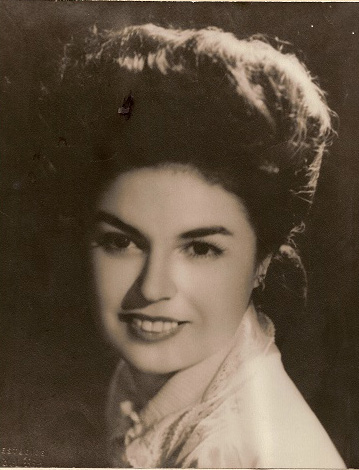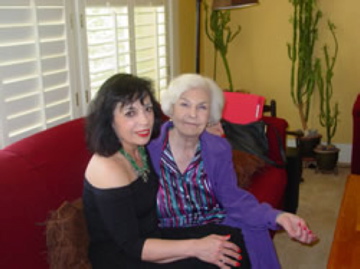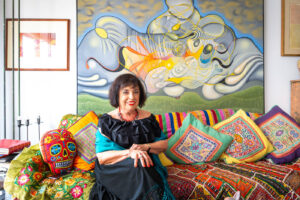
Today would have been my mother’s 104th birthday . She was an exceptional woman and, every year, I like to share a little bit from a book I’ve been working on about the lessons I learned from different people that got me to this point in my life. There’s also a link to a heartfelt but not energetic video I taped on my computer one late night in my old house. I would absolutely do it differently today but the message would be the same.

Prelude
A few weeks before she passed away my mother began telephoning long time friends, distant relatives, favorite nieces and nephews, and her immediate family to announce that she would be dying soon. No one believed her. Hadn’t she just taken a long car trip to Phoenix, with my son, Rodrigo, chatting all the way, to attend a family wedding where she looked radiantly beautiful and was her usual grande-dame-self?
But I knew she meant it. She didn’t like what was happening to her mind and body. At 88 years old, she’d had it and was ready to depart with her dignity, elegance and pride intact.
Though she thought of herself as the ugly duckling of her family, even in old age mother was a strikingly beautiful woman with sparkling, penetrating green eyes, silky alabaster skin, a lush head of shining silver hair and hands that spoke of hard work but were always perfectly manicured. She took great care and pride in her grooming and was disdainful of anyone who didn’t. She had what we call porte, (a regal carriage), a brilliant, sharp and curious mind, and a captivating personality. She was irresistible. People fell under her spell. To me, she was invincible and immortal, so it was heartbreaking to see her gradually deteriorate.
The feet were the first to go. Mother had a distinctive way of walking: head held high, shoulders thrown back, spine perfectly straight, fast, clipped purposeful steps, almost as if she was marching. But in her 70s, she’d taken a bad fall and sprained her foot. It never healed correctly and now arthritis had set in, causing her immense pain. Worst of all, mother could never wear pretty shoes again. She hated her orthopedic lace-up shoes, those zapatones from SAS, but that didn’t stop her.
Every afternoon she’d take off in her car to call on friends, roam the malls to window shop, buy groceries, and her almost daily trips to Barnes and Noble where she’d sit by herself for hours looking through large-print romance novels until she found the steamiest one to take home. Oh, how she loved her light blue Subaru station wagon! She had a long-lived and passionate anthropomorphic relationship with this machine. Fiercely independent, she seldom called for help for anything for herself but if the axle broke or the ignition went out in her beloved automobile she’d call in all chits. But when she had a minor fender bender, followed by a traffic violation for driving too slowly on the freeway she grew afraid and reluctantly gave up driving, which to her meant freedom. She felt as if her wings had been clipped. The odometer read 145,000 hard-driven miles.
She had always emphatically said that she would rather die if she developed two common conditions of old age: incontinence and dementia. She was terrified of smelling like an old lady and lived on TicTacs and other breath mints. She needn’t have worried on this count; she had a most compelling natural smell and every perfume took on a seductive aroma on her skin. I still remember the scent of Prince Machiavelli that she favored when I was a child and the Red Door of her last years still lingers in my mind. When the “accidents” became daily occurrences, she bathed constantly, doused herself with talcum powder, and changed pajamas, becoming more despondent with each incident.
We were all alarmed when we realized she was forgetting things and asking the same questions over and over. Both of her sisters have Alzheimer’s and she was deeply frightened of plunging into that abyss. She would make lists, do memory exercises, and write down conversations so as to not repeat herself. It was heart wrenching to watch her valiant efforts. She was somewhat relieved but not totally convinced when my doctor reassured her that her memory loss was normal for a woman 88 years old and that if she had dementia she would not be able to sing or play the piano which was her greatest pleasure.
Mother loved to entertain. It was a way of life for her as it is for me. We always had company at our family ranch—cousins, aunts, uncles, family friends—who’d stay for a weekend or a month. And people would often drop by for breakfast, lunch and dinner in our city home and sit for hours after the meal haciendo sobremesa (the interlude after a meal when people sit and chat for hours). Mother had stayed in close contact with her high school friends and in her latter years they’d get together and reminisce at her monthly ladies’ luncheons that she’d plan for in great detail, setting her tables seasonally. But socializing became a chore instead of a favorite past time when her hearing began to fade. Gatherings often turned into screaming matches because none of her contemporaries would wear their hearing aids. Mother at least wore one some of the time and could carry on her entertaining, provocative conversations in small groups, and still charm any person one on one. She was a master at this art.
Mother was a gifted and adventuresome cook, with a palate so extraordinary that she could duplicate any flavor she tasted, and she loved to eat. She’d get sudden cravings that demanded instant gratification (a trait that I’ve inherited) and would just as easily whip up some crepes Suzette as an enchilada, spaghetti with meatballs or albóndigas, lamb curry or homey calabacitas con queso. Our whole life revolved around food. She loved to shock people by announcing that the three greatest pleasures in life were to cagar, comer y coger, ¡y en esa orden! (shitting, eating and fucking, and in that order!).
But she was cursed by “los dientes Gabilondo,” her father’s pronounced overbite, which meant that her teeth were never quite perfectly aligned, and they eventually wore away, exposing nerve endings and causing tremendous pain. Suddenly she was faced with the decision of living with bad teeth or getting dentures. She opted for the latter but it was a devastating mistake. With her teeth out she looked like an old lady for the first time and it made her deeply unhappy and self-conscious. And she never got used to them. Chewing was so difficult that at the end all she could eat was pureed oatmeal, ice cream and Coca Cola with an Ensure nutritional drink. This most unsatisfying diet dulled her senses and killed her pleasure in eating. The last time we cooked together I had her chop some basil and thyme and she lit up for a moment luxuriating in the aroma of the fresh herbs and suddenly she was hungry again. I had made our friend Peggy Knickerbocker’s roasted asparagus with balsamic vinegar and she sucked on them contentedly. That was the last thing she willingly ate.
One week later she had a heart attack.
There is nothing I enjoyed or will miss more than singing with her in harmony to old Mexican torch songs: La borrachita, Adiós mi Chaparrita, Un viejo amor, and her favorites Alborada and Marchita el alma. I sang these and other favorite songs to her on her last night as she lay dying. She never took her eyes off me and blew me little kisses. I told her that she looked and smelled beautiful and what a wonderful mother she had been to me. Most of all I thanked her for helping me become a success and promised “to carry the torch to the end of the road” as she had asked me to do in the dedication of her book. She smiled.
She knew that her job was done. I had learned her lessons well and was equipped to deal with whomever and whatever lay in store for me.

